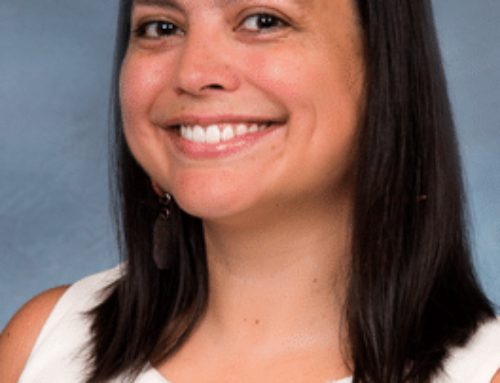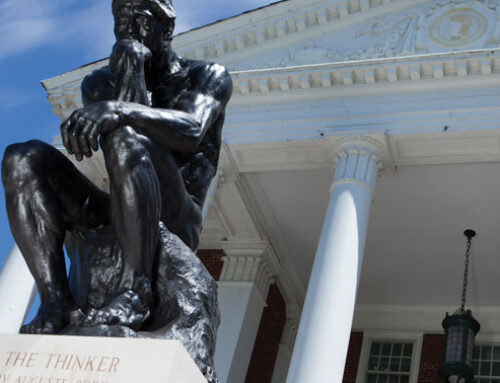By Joseph Garcia —
Karamo Brown, culture expert on the Netflix reboot of “Queer Eye,” came prepared to laugh and get deep with the Louisville community Feb. 5. Students, staff, faculty and community members alike packed the Student Activities Center’s ballroom just to see the three-time Emmy winner and hear his thoughts on the intersections of identity.
Along with “Queer Eye,” Brown also appeared on “Dancing with the Stars” in 2019 and “The Real World: Philadelphia” in 2004. He has also worked as a social worker, written a memoir and co-authored a book with his son Jason. Lately, Brown has been working on his podcast, “Karamo,” and a new skin care line.
The Student Activities Board, LGBT Center and Black Student Union coordinated the event.
Brown learned how to grow and learn from his multitude of identities as a black man, an openly gay man, a son of immigrant parents, a Christian, a single father and former social worker.
“Being here in this room with us, sends a powerful message about who we are, what we care about and value. And that’s inclusion and celebrating all the identities that make us a community,” said Brian Buford, director of employee development and success at the University of Louisville.
Brown talked about his childhood and how it was a struggle for him to celebrate who he was.
“Growing up in Texas, to immigrant parents, with the name Karamo, it was not cute, okay?” Brown said. “There were a lot of times I felt alone and isolated. I knew that I was different because I would bring things to lunch that I loved, like curry goat or ox tails, and people at school would immediately let me know that it wasn’t okay to bring.”
As a child, Brown began to internalize that being different was a bad thing. He even changed his name to Jason because people would make a face when he said his real name.
“Sometimes the faces hurt more than the words, because it was like I ‘m showing you who I am and I’m proud of who I am and then your response to be curious is ‘What?!'” Brown said, “That is a very hard pill to swallow when you’re a kid, especially when you’re still trying to build your self-esteem and figure out who you are in this big world.”
Phoenix Washington, a recent Liberal Arts graduate, said it was freeing to hear Karamo speak.
“It was nice to hear about someone with a checkered past who used their identities to build themselves up,” Washington said. “Even more freeing as a queer black person trying to figure out where you fit.”
On being “marginalized.”
This discontent to all his identities, Brown said came from a shared understanding from the people around him and the media: different meant not as good.
“It meant you’re not as special, that you don’t deserve as much,” Brown said. “And I remember getting around the age of 13 or 14 where I started to hear this word marginalized.”
It’s something we still hear to this day and is all over news outlets. Brown said at 14 he didn’t really understand what it meant when people around him began saying he was apart of marginalized communities, but now fully understands the power and implication of the word.
“There’s an undertone. When someone says you’re part of a marginalized community, they’re saying you don’t deserve access, you’re not going to attain what someone else has attained, you don’t have the right to do so,” Brown said. “When I look at myself as a black man, as a son of immigrants, as a gay man–I don’t think of any of these things as marginal. I think of all of these things as gifts that I’ve been given to create a better life for myself.”
Battling a diminished self-esteem.
But at the time, his self-esteem was still lacking due to all the negative things he was hearing from people around him. Brown realized they were projecting their fears and issues on him. “It was causing me anxiety,” Brown said.
“I realized if I wanted to have better self-esteem, one of the things I could personally do and start doing immediately was practicing not repeating the negative things I heard about myself.”
Brown said the only way to combat that feeling of waking up in the morning and wishing something about yourself is different is to stop repeating the negative things people say about you. He said you have to start saying the good things about yourself.
“All of your identities make you special, like I said, they are gifts to me,” Brown said, “The reason I have my job on ‘Queer Eye’ is because I literally went into a room full of 100 other gay guys and decided I was not going to be ashamed of any part of my identities. I said to myself, ‘no one in here has all of my identities, I’m going to share with them what is great about me.'”
Brown said that despite this, people will try to stifle your voice, or that we ourselves will stifle our own voices.
“Social media culture makes it so very easy to look at someone’s life and say ‘Wow. Look at what they’ve done, what’s wrong with me?'” Brown said, “Let me tell you something, when it comes to your identities and appreciating and loving every part of you–comparison is the thief of joy.”
More than just black and gay.
This is all to say that the biggest part of Brown’s identity has nothing to do with his appearance, sexuality or background. It’s his ability to ask for help and his ability to start again.
“That’s why I don’t like New Year’s resolutions,” Brown said, “No one says that if you don’t make your New Year’s resolution in the timeline you thought, that you can actually start again. I want everyone in here to remember that part of your identity is your ability to ask for help if you don’t know what you’re doing and also to start again.”
“Every day is a brand new day and we know that to be true. One of the things I know to be true, and I’ve said this on ‘Queer Eye,’ is that failure is not the opposite of success. It’s part of it.”
Brown said that by doing this and allowing yourself to make mistakes, you free yourself from the shackles of yesterday.
“If a little child were here right now, and we were like ‘He’s about to start walking for the first time!’ and he fell and busted his head,” Brown said, “none of us would be like ‘You’re never gonna walk again!'” To which Brown and the audience laughed.
Curiosity and the soul.
Another one of the many big takeaways Brown wanted the audience to remember was that they should strive to stay curious. As kids, we were continually told to explore and try new things, but at some point that stops.
We get into cliques and avoid anything different.
“I’m a big believer that’s where we stop learning how to connect with people and with the world around us–when we stop being curious,” Brown said.
Instead, Brown wants people to be excited about different cultures and foods.”When you get excited about something new you start to begin to open yourself up to new possibilities. You start to find yourself getting curious about so many things around you that you didn’t know you could be curious about,” Brown said.
“Curiosity feeds your soul and mind in such a way, believe me.”
And Brown does this everyday.
“What it does for me is I start to learn. The more I learn, the more I grow, the more I grow the more I can connect with other people. The more that I connect with other people the more I feel alive and apart of this world.”
Photo by Anthony Riley // The Louisville Cardinal




